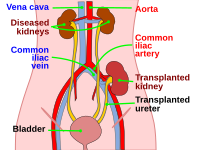
Photo from wikipedia
BACKGROUND To establish a dietary self-management evaluation indicators scale for kidney transplant recipients and to test the reliability and validity of the scale. METHODS Based on the knowledge attitude practice… Click to show full abstract
BACKGROUND To establish a dietary self-management evaluation indicators scale for kidney transplant recipients and to test the reliability and validity of the scale. METHODS Based on the knowledge attitude practice model (KAP model) of health-related behavior changes, an evaluation indicators scale of dietary self-management ability of kidney transplant recipients was constructed through a literature review, expert consultation and group discussion. A questionnaire survey was carried out with 102 kidney transplant recipients from a large tertiary hospital to test the reliability and validity of the constructed scale. RESULTS The dietary self-management ability scale for kidney transplant recipients had 29 items in 3 dimensions. The content validity at the scale level was 0.969, and the content validity at the item level was 0.778-1.000. Exploratory factor analysis extracted 3 common factors, and the cumulative variance contribution rate was 68.610%; the correlation coefficient between each dimension was 0.467-0.629, and the correlation coefficient between each dimension and the total score of the scale was 0.648-0.845. Cronbach's α for the scale was 0.831, and the test-retest reliability of the scale was 0.910. CONCLUSIONS The constructed dietary self-management ability scale for kidney transplant recipients has good reliability and validity and can be used as a tool to evaluate the dietary self-management ability of kidney transplant recipients.
Journal Title: Annals of palliative medicine
Year Published: 2020
Link to full text (if available)
Share on Social Media: Sign Up to like & get
recommendations!